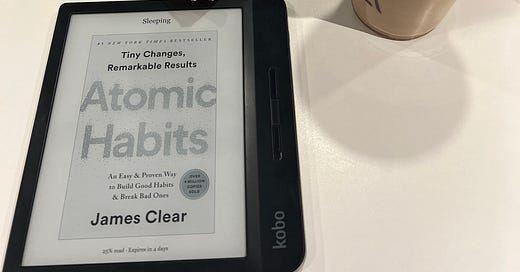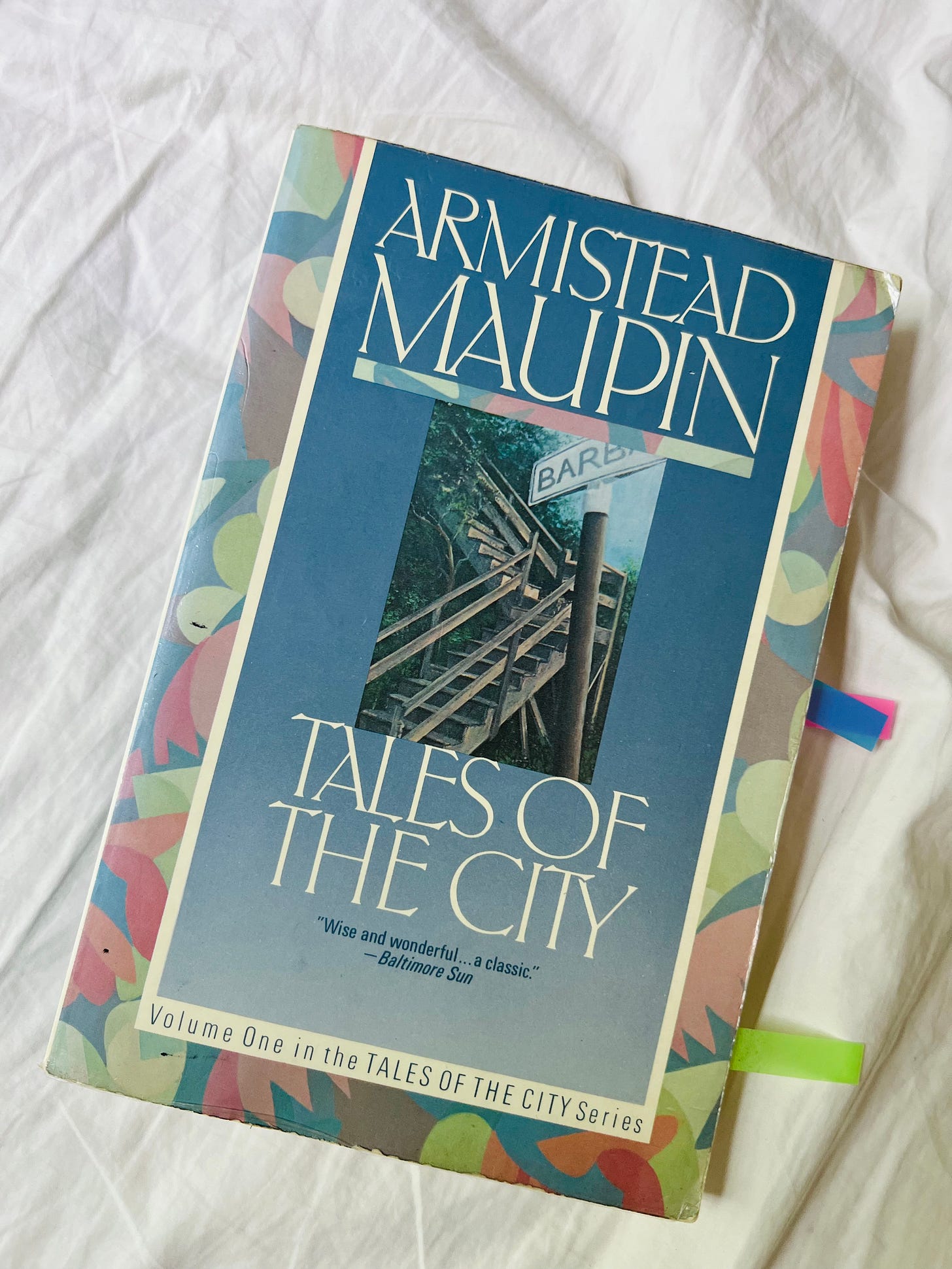Dear reader,
This newsletter began as a way for me to talk about the books I was reading. Simple enough stuff. But as time went on, the idea of writing something about every single book began to make me feel queasy. The truth is, I don't actually have an opinion about everything I read! Often I'm ambivalent, or my opinion essentially begins and ends with a tossed off adjective: it was either fine, delightful, silly, stupid, cerebral, or worst of all — except for when I want to be lulled into a gentle slumber! — boring.
Take for example Tales of the City, Armistead Maupin's San Francisco serial about the increasingly intertwined lives of a group of gay men and women orbiting around a quirky apartment complex in the city. The book is a blast, and as I micro-dose it by reading a chapter or two a day, I find myself chuckling at the occasional passage, like this one about a vain straight man struggling to get excited for a night on the town.
He slapped his belly in front of the closet mirror. It made a solid sound, like a baseball hitting a mitt. Not too shabby for thirty-two! - Tales of the City by Armistead Maupin.
But there’s no real need to dive much deeper. It's frothy in the way of a fruity cocktail, and after I gulp some of it down, that's usually enough.
My review? Delightful, silly, stupid. Three adjectives out of five.
There's a certain genre of book, however, that I find myself unable to shake like a lingering cough from a bad cold — self-help.
I know what you're thinking — Andrew's perfect and couldn't possibly benefit from any self-help — and I want to go ahead and say ‘Thank you for saying that.’ But ever since I started working on my book, I've lived in fear that I am deficient in some crucial indeterminate way, and that the only way to find out which one is to read every book about productivity, ADHD, time management, and optimization I can get my hands on.
Some of the ones I've read, or at least made it through 60% of before giving up (the irony that all these books so focused on productivity would be more effective as 5,000 word articles is not lost on me) include: Atomic Habits, Stolen Focus, Building a Second Brain, Getting Things Done, The Scattered Mind, Four-Thousand Weeks, The Deadline Effect and probably more that I can't remember off the top of my (increasingly large) head.
These books are not equal in quality. Some, like Four-Thousand Weeks, with its realistic and helpful thesis that if we have only a small amount of time on earth, we’re better off picking a lane and sticking to it instead of endlessly trying to have it all, are genuinely good and helpful. But most, like Atomic Habits by James Clear, are a jumbled mess of common sense, bootstrapping advice and barely hidden distaste for the fat, poor, and/or lazy people of the world.
Above: A very humbling photo I took while reading Atomic Habits alone at McDonalds
For the sake of keeping this newsletter under 2,000 words, I’m going to focus my attention here on Atomic Habits, which has apparently sold over 5 million copies. I can understand why the book has been such a smash, because who among us doesn’t feel like their life is constantly in danger of spinning out of control, if it hasn’t already. We’re buried under a seemingly never ending torrent of tasks and distractions, and feel so jerked around by this, that it’s hard to ever really find any semblance of a consistent routine. If we can develop good habits, it stands to reason that we might be one step closer to getting this onslaught under control.
For years, the book shimmered at me from the shelves of every Indigo I visited, my curiosity held in-check by my deep fear of being cringe, until I finally picked it up, enticed by its promise of “an easy & proven way to build good habits & break bad ones”
So, does it deliver? I’m skeptical. The basics of habit-building, which Clear acknowledges he didn’t create himself, are that habits are built with four steps: cue, craving, response, reward. To succeed, he says, make it obvious, make it attractive, make it easy, and make it satisfying.
This is all easy to grasp, but as Clear elaborates on his system, he often gets in his own way. In one section, he suggests that if you want to develop positive habits, like going to the gym or writing every day, you should surround yourself with people who are already doing those things. This sounds about right! But now look at how he explains this point, cherry picking scientific findings to buttress his own thesis, inadvertently showing his own ass in the process.
One groundbreaking study tracked twelve thousand people for thirty-two years and found that “a person’s chances of becoming obese increased by 57 percent if he or she had a friend who became obese.” It works the other way, too. Another study found that if one person in a relationship lost weight, the other partner would also slim down about one third of the time. Our friends and family provide a sort of invisible peer pressure that pulls us in their direction. - Atomic Habits by James Clear
The implication, of course, being that if you want to be thin, you should ditch your fat friends. I bring up this specific example because when given the choice between empowering his readers and telling them things like ‘Ask your buffest friend if he’d show you the ropes at the gym!’ Clear is always sure to balance his advice with a counter-example involving the type of person he seemingly abhors. And why? If he genuinely wants to help the people reading his book, he should know better than to make his readers feel worse about themselves.
What’s ironic about this, is that when he’s not putting down overweight people, he preaches an abundance mindset. A belief system that despite lots of therapy has never worked on me. Abundance being: instead of telling yourself that you have to take out the trash, tell yourself you get to take out the trash. Hashtag blessed.
Sometimes, the way he does this nearly made me spit out my drink. Like after this particular sentence, which reads as if it was written by a cyborg.
Instead of telling yourself ‘I need to go run in the morning’ say ‘It’s time to build endurance and get fast.’
Ah yes, “It’s time to build endurance and get fast,” – now that’s a sentence a normal person would write!
And then there’s the bit about how to increase your sex drive by creating a motivation ritual and “associating your habits with something you enjoy”
He explains: “For instance, if you always play the same song before having sex, then you’ll begin to link the music with the act. Whenever you want to get in the mood, just press play.”
OK, sure babe. But if you can only get in bed with someone if you play Who Let the Dogs Out first, then perhaps it’s time to reassess your relationship.
In any case, these are just some of the more egregious examples I’ve pulled from the book. What’s truly frustrating to me is that among these ridiculous passages are some actual tidbits that might be useful to a reader. Like the section where Clear explains the difference between motion and action, which is more or less the difference between endlessly preparing for a project and actually doing it.
If motion doesn’t lead to results, why do we do it? Sometimes we do it because we actually need to plan or learn more. But more often than not, we do it because motion allows us to feel like we’re making progress without running the risk of failure. Most of us are experts at avoiding criticism. It doesn’t feel good to fail or to be judged publicly, so we tend to avoid situations where that might happen. And that’s the biggest reason why you slip into motion rather than taking action: you want to delay failure.
This resonated to me on an almost physical level. For the longest time as I was working on my book, I was stuck in this motion stage. Reading and re-reading, chasing down archival leads, scheduling additional interviews, yada, yada, yada. It’s not that I regret doing this — I’d rather be slow and accurate than fast and wrong — but at a certain point I realized that I have to actually start writing the damn thing.
I hesitate to credit Clear for this revelation, and I don’t really think you should read Atomic Habits, but I also won’t try and stop you. As a genre, self-help is appealing to me more for its promise than for any lasting impact it might provide. That’s The Secret of it all. Sometimes I want to believe that complex problems can have simple solutions. Even if in the end, after making my way through a book like Atomic Habits, I know it’s more likely I’ll end up exactly where I started.
But there’s always next time.
XOXO,
Andrew
PS. It’s been a while since my last post, but I’d love to hear from you if you’re still reading. Is there anything you’d like me to write about? Book recs? Unsolicited advice? Shoot me a line by hitting reply to this email!




